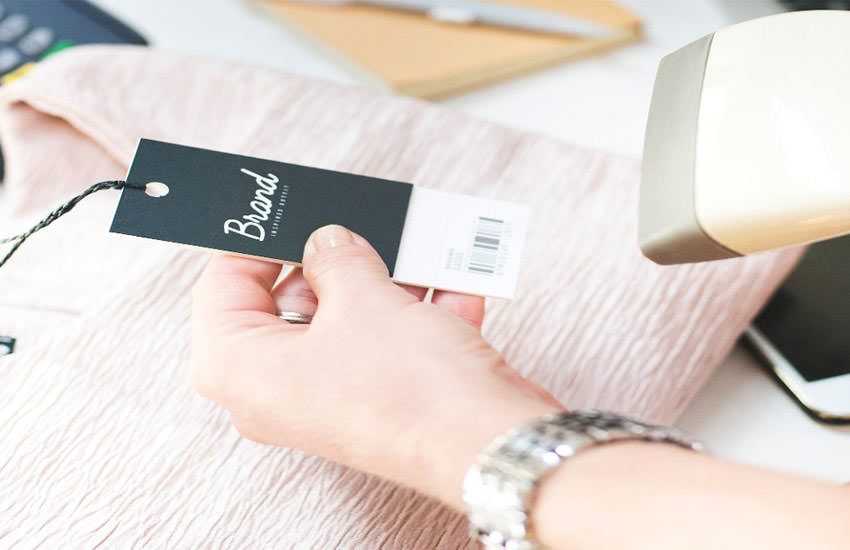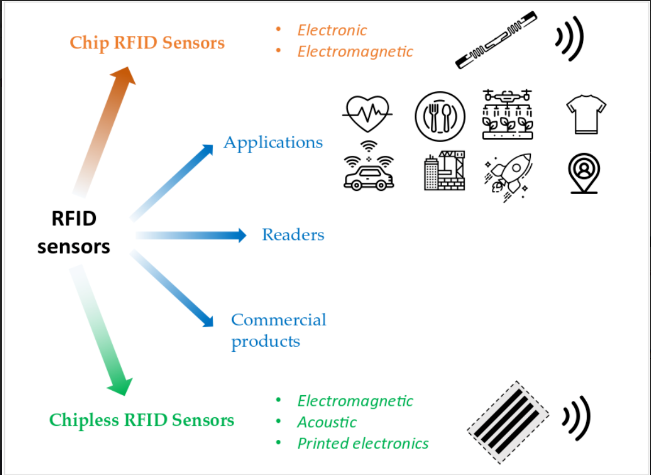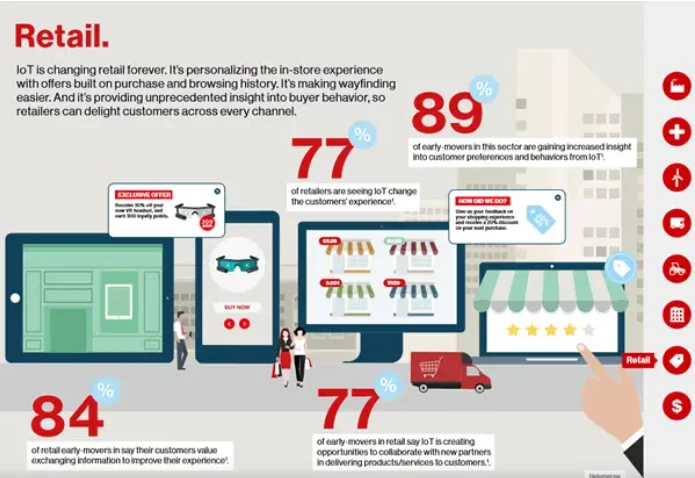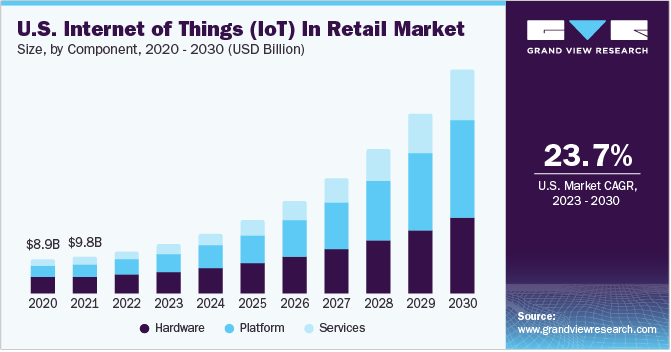IoT in Retail – How IoT Works in Retail Industry

While IoT has already transformed a couple of industries, the role of IoT in retail is considered a major game-changer for how business is done today. How things are connected is only expected to continue to be a major factor for the future of businesses in the retail sector.
Although retail companies can’t find must-have, ready-to-use IoT applications that will be able to solve all of the problems these companies face, there are still many solutions offered by IoT development companies that can help these organizations improve their ROI and create a solid groundwork on which they will later be able to develop even better and more complex IoT applications.
Let’s check our various applications of how IoT for retail industry can be used, what’s the actual use and the use cases!
How to Use IoT for Retail Industry
Being a retailer, you’re likely seeking solutions to overcome challenges in inventory management, customer personalization, and real-time insights. So what’s the solution to it? Fortunately, the answer lies in leveraging the power of IoT (Internet of Things) technology. You can solve these problems by adopting IoT in retail business. Consider the following major strategies.
Implement RFID and Sensor Technology

Image source:- mdpi.com
To use IoT in the retail industry, implement RFID tags or product sensors. RFID tags contain unique identification information that readers or sensors can wirelessly scan. By attaching RFID tags to products, retailers can track inventory in real time.
This enables automated inventory management, as the system can automatically update stock levels when products are sold or added. RFID technology facilitates automated reordering, as inventory levels can trigger restocking processes. This helps reduce stockouts, optimize inventory levels, and streamline supply chain operations.
Leverage Smart Shelves and Displays
Deploying smart shelves equipped with different types of sensors in is another effective way to leverage IoT in Retail industry. These smart shelves can monitor product levels and automatically trigger restocking when inventory reaches a threshold. For example, when a product is removed from the shelf, the sensor detects the change in weight or the absence of an RFID signal and initiates restocking.
Automation saves time and effort for store staff, ensuring that shelves are always adequately stocked. Furthermore, incorporating digital signage into displays allows retailers to display dynamic product information, promotions, and pricing. This creates an engaging shopping experience and provides customers with up-to-date information, influencing their purchasing decisions.
Utilize Beacons and Mobile Apps
Implementing beacons and developing mobile apps can greatly enhance customer experience in retail stores. Beacons are small devices that leverage Bluetooth technology to communicate with customers’ smartphones when they are within proximity. Retailers can send personalized offers, discounts, and notifications directly to customer’s mobile devices by strategically placing beacons throughout the store. These targeted messages can be based on the customer’s location within the store or their previous purchase history, increasing the likelihood of making a sale.
Developing an app tailored to the retail store also enables customers to access various features such as product search, personalized recommendations, and mobile payments. This improves convenience, engagement, and loyalty among customers. For the best results, consider outsourcing mobile app development services to ensure optimal assistance and exceptional solutions.
Integrate IoT Analytics Platforms
Leveraging IoT analytics platforms is crucial for extracting valuable insights from the data generated by IoT devices in the retail environment. These platforms collect, process, and analyze vast amounts of data, providing actionable insights. Retailers can make data-driven decisions by analyzing customer behavior, buying patterns, and operational efficiency. For instance, analyzing foot traffic patterns can help optimize store layouts for better customer flow.
Understanding buying patterns can be vital to improving inventory management strategies and identifying popular products that require additional promotion. Operational efficiency can be improved by analyzing data on energy usage or staff scheduling. IoT analytics platforms enable retailers to derive meaningful insights that guide decision-making and drive business growth.
Enhance Security and Privacy Measures
As IoT devices collect and transmit data, it’s crucial to prioritize security and privacy measures. Implement strong data encryption and authentication protocols to protect sensitive customer information. Regularly update and patch IoT devices to address any vulnerabilities.
Implement access controls and user permissions to ensure that only authorized personnel can access and manage IoT devices and data. It’s important to comply with relevant privacy regulations and obtain customer consent for data collection and usage. Retailers can build customer trust and safeguard their valuable data by prioritizing security and privacy.
What are the benefits of IoT in the retail industry?
One of the major concerns of retail companies is how they can become more profitable and efficient within their stores. Handling internal processes more quickly means a lot in retail, and here is how IoT can help achieve this.
IoT is used to improve the customer experience

Image source:- Customer Experience in The World of IoT
Mobile users have high expectations when it comes to their retail store experience. They seek excellent customer service, reliable information, swift delivery, and more. To fulfill these expectations, retail companies lean on various logistics processes that are crucial for delivering a seamless and satisfying customer experience.
Not only this, but retail companies also rely on the Internet of Things application development to improve self-checkout, digital signage, and other valuable technologies that help provide users with a better experience. The IoT creates an infrastructure and provides devices that allow data circulation throughout the buyer’s cycle to be more efficient.
so , ultimatley implementing IoT solutions in the retail industry offers significant advantages in solving customer experience problems.
Improving flow management in-store
Retail companies have always tried to improve how people navigate their stores. The IoT allows adding advanced digital tools to this process, thus improving it drastically.
Instead of having a person monitoring traffic patterns and then trying to find a connection with trends, utilizing microphones, beacons, and smart cameras, IoT can provide more accurate and detailed data to retail companies about how their consumers behave.
Some big companies have even started using various IoT technologies to monitor their consumers and see how their traffic levels depict various patterns. These firms are joining hands with top IoT application development company to know the behavior of their clients.
Allowing the delivery of coupons and promotions on time
Traditional brick-and-mortar retail stores suffer from some inefficiencies. One of the areas where they sometimes fall behind online retailers is to meet the current demand quickly, recognize what customers need, and upsell and cross-sell products effectively.
Newly developed beacons and different types sensors used in IoT are giving brick-and-mortar retailers a glimpse of what this technology can provide them with. Some retailers have tied their customer experience data using beacons, allowing them to customize the content they push into their stores or on the displays of their customer’s smartphones. This targeted content has allowed them to engage customers better and drive more sales.
IoT has offered traditional retailers a brand-new opportunity to give their potential customers promotional materials shaped toward the current demand. This is only the beginning, as retailers are looking to develop even more sophisticated interactions with their customers through these measures.
Better inventory traceability
IoT technology has made it easier for companies to trace their products even after they have been sold. By using devices like smart tags or sensors, companies can collect real-time data about their products’ location, usage, and condition. This data is sent to a central system through the Internet, allowing companies to keep track of their products throughout their life cycle.
When there’s a need for a product recall, IoT comes to the rescue. Instead of relying on manual reports or customer feedback, IoT devices provide up-to-date information about the specific products that need to be recalled. This speeds up the recall process and makes it more accurate, reducing the risks and costs associated with faulty or unsafe products.
For example, in the automotive industry, connected car technology enables manufacturers to monitor the performance and safety of their vehicles remotely. If a problem is detected, the manufacturer can send a software update or recall specific vehicles for repairs, based on the data collected from IoT devices in the cars.
Examples of IoT in Retail Industry
The Internet of Things in the retail industry has made significant advancements in retail, transforming traditional shopping experiences and driving operational efficiencies. From cashier-less stores to personalized shopping recommendations, IoT has revolutionized how retailers engage with customers and manage their operations. Here are a few examples of IoT in the retail industry, showcasing its diverse applications and impact:
- Amazon Go: Amazon’s cashierless stores leverage IoT technologies, including computer vision and sensors, to enable frictionless shopping experiences. Customers can pick up items, and payment is automatically processed, eliminating the need for traditional checkout.
- Zara’s RFID Inventory System: Zara uses RFID tags to track inventory, providing real-time visibility into stock levels. This allows them to optimize inventory management, reduce out-of-stock situations, and improve operational efficiency.
- Walmart’s Smart Shelves: Walmart implemented IoT-enabled smart shelves that monitor inventory levels, track expiration dates, and provide real-time updates. This system helps optimize product availability and reduce waste.
IoT Retail Solutions – A Comprehensive Approach:
The use of IoT devices in the retail industry is rapidly increasing, leading to significant growth in the global IoT in retail market. In 2022 the market was worth USD 42.38 billion, expected to grow by 28.4% annually from 2023 to 2030. Retailers need to take predictive actions when implementing IoT in retail industry. Let’s look at those actions:

Device Connectivity:
Establishing a reliable and secure network infrastructure is essential for connecting IoT devices in retail. This typically involves setting up a robust Wi-Fi or cellular network to ensure seamless communication between devices. Reliable connectivity enables real-time data transmission and enables devices to interact with each other and centralized systems.
Integration and Interoperability:
To fully harness the benefits of IoT, it’s crucial to ensure compatibility and seamless integration between different IoT devices, systems, and existing infrastructure. This allows for data sharing and interoperability, enabling devices to work together efficiently. The integration enables a holistic view of data and streamlines processes, leading to more effective operations and enhanced functionalities across various IoT devices.
Scalability and Future-Proofing:
Designing IoT solutions with scalability is essential for accommodating future growth and technological advancements. Scalable IoT solutions can handle increasing device deployments, evolving data volumes, and changing business needs. By planning for scalability, retailers can ensure that their IoT infrastructure can adapt and grow as their business expands. Staying updated with the latest advancements in IoT technology is also important for future-proofing, allowing retailers to leverage new opportunities and emerging trends.
Collaboration and Partnership
Collaborating with technology vendors, system integrators, and IoT solution providers is valuable in successfully implementing IoT solutions in retail. These partnerships allow retailers to leverage the expertise and experience of industry specialists. Collaborators can offer guidance, support, and tailored solutions, helping navigate the complexities of IoT adoption. By working together, retailers can ensure effective implementation, seamless integration, and successful outcomes in their IoT initiatives.
Conclusion:
More and more retailers are looking to implement the Internet of Things (IoT) to improve their business performance. Many companies have already started seeking assistance from reputed software development firm for IoT development, and it’s expected that such partnerships will increase in the future, especially when considering that these solutions will only improve and improve.
One such IoT solutions provider is Finoit Technologies. Finoit Technologies offers comprehensive IoT solutions tailored to the specific needs of retailers. With their expertise in IoT development, they help retailers implement IoT technologies seamlessly, enabling them to optimize their operations, deliver personalized customer experiences, and drive business growth.
Connect with our development expert to harness the power of IoT devices, data analytics, and connectivity to gain valuable insights, automate processes, and make informed decisions. This empowers retailers to streamline inventory management, enhance supply chain efficiency, engage customers with personalized experiences, and stay ahead of the competition.
Need Help With IoT
Application Development?


